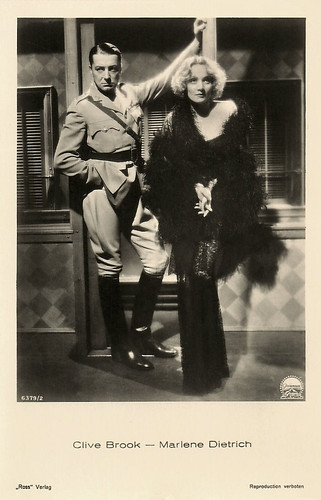
German postcard by Ross Verlag, no. 6379/2. Photo: Paramount. Marlene Dietrich as Shanghai Lily and Clive Brook as 'Doc' Harvey in Shanghai Express (Josef von Sternberg, 1932).
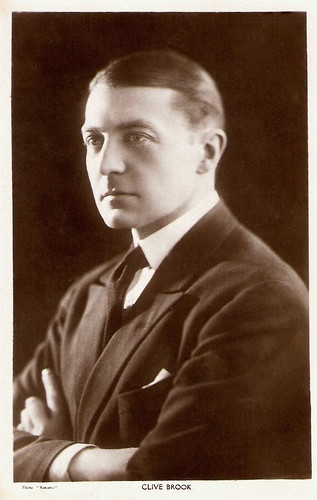
British postcard in the Picturegoer Series, London, no. 63.
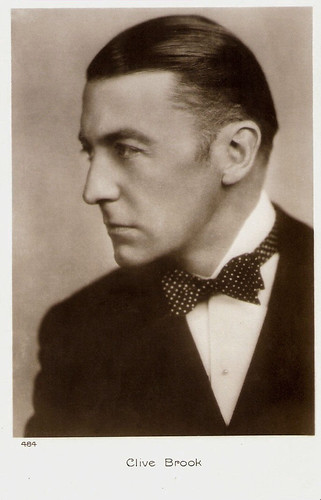
French postcard by Cinémagazine-Edition, Paris, no. 484.
The perfect British gentleman
Clifford Hardman Brook was born in London in 1887. He was the son of opera singer Charlotte Mary and George Alfred Brook, a landowner of a goldmine. He attended Dulwich College because of his father's desire for him to be a lawyer, but family financial problems caused him to leave at age 15. He then studied elocution at a polytechnic.
Clive worked as a journalist and insurance agent. In September 1914, he enlisted in the British army as a private, served in the Artists' Rifles and left the service at the end of World War I as a major. In 1918, he made his stage debut as Phillip Evans in 'Fair and Warmer'. He made his London debut in 1920 as Hugh Crawford in 'Just Like Judy'. His other stage experience included 'Oliver Twist', 'If I Were King', and 'The Importance of Being Earnest'.
From 1919 he also played in British films, while also working on the London stage. He appeared in such silent films as Trent's Last Case (Richard Garrick, 1920), Sonia (Denison Clift, 1921) with Evelyn Brent, and A Debt of Honor (Maurice Elvey, 1922) with Isobel Elsom.
Brook played the title role in The Sheik (George Wynn, 1922). Then followed A Tale of Two Cities (W. Courtney Rowden, 1922) based on the Charles Dickens novel, The White Shadow (Graham Cutts, 1923) and Woman to Woman (Graham Cutts, 1923) both starring Betty Compson and written by Alfred Hitchcock.
Clive Brook became a popular, suave leading man, the perfect British gentleman with a stiff upper lip. He occasionally played villains as well.
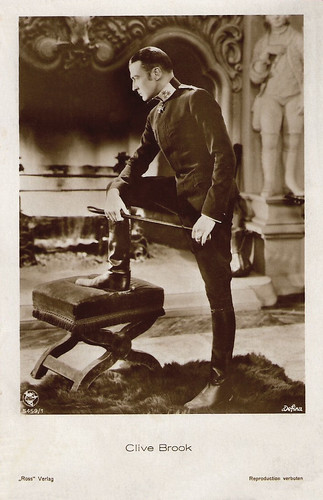
German postcard by Ross Verlag, no. 5459/1, 1930-1931. Photo: Defina.
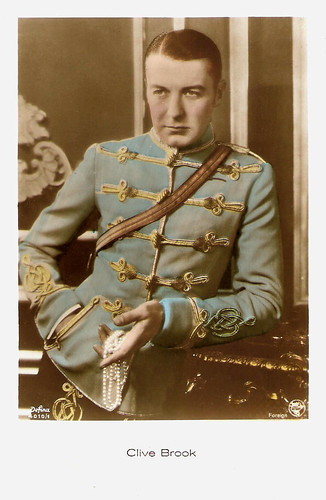
British postcard, no. 4010/1. Photo: Defina / First National Pictures.
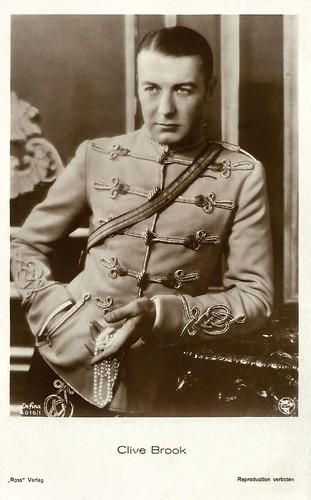
German postcard by Ross Verlag no. 4010/1, 1929-1930. Photo: Defina / First National Pictures.
Sherlock Holmes
In 1924 Clive Brook went to America where he continued his successful career smoothly. Employed by Thomas Ince Corp., he started to work on the film Christine of the Hungry Heart (George Archainbaud, 1924) with Florence Vidor.
This was followed by more silent films such as The Woman Hater(James Flood, 1925), and Seven Sinners (Lewis Milestone, 1925) with Marie Prevost.
He moved to Paramount Studios in 1926 and took part in such remarkable films as Barbed Wire (Rowland V. Lee, 1927) starring Pola Negri, and Hula (Victor Fleming, 1927) with Clara Bow.
He produced one of his best screen interpretations in Underworld (Josef von Sternberg, Arthur Rosson, 1927). He played an alcoholic ex-lawyer who is taken under the wing of a professional thief (George Bancroft). As the educated Rolls Royce Wensel, brought low by drink and redeemed by a gangster, Brook makes use of every shading of expression in his sensitive face, conveying more with fewer words in one glance than anyone else in the cast.
Another great film was The Four Feathers (Merian C. Cooper, Lothar Mendes, 1929) with Richard Arlen and Fay Wray. He rounded off the 1920s with The Return of Sherlock Holmes (Basil Dean, 1929, the first of three films in which Brook impersonated the famous detective with a non-traditional tweed cap and long side whiskers.
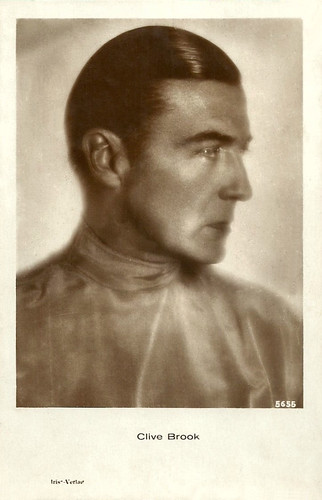
Austrian postcard by Iris Verlag, no. 5656.
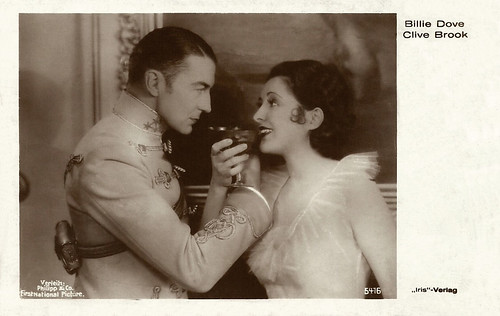
Austrian postcard by Iris Verlag, no. 5416. Photo: Verleih: Philipp & Co. / First National. Clive Brook and Billie Dove in Yellow Lily (Alexander Korda, 1928).

Dutch postcard, no. 653. Photo: Filma.
Stiff but effective
Clive Brook made a smooth transition into the talkies with his attractive, clipped accent. He had star billing in Paramount's first all-talkie, Interference (Lothar Mendes, Roy Pomeroy, 1928), along with William Powell and Evelyn Brent.
One of his best-remembered appearances is opposite Marlene Dietrich and Anna May Wong in Shanghai Express (Josef von Sternberg, 1932). He was a bit stiff but effective as the British Army doctor who was once Shanghai Lilly's lover.
Brook remained a top draw until at least 1934. In 1935, Brook and his wife moved back to England permanently, partly due to threats to kidnap their children. At this time the entire movie colony in Hollywood was alarmed at kidnapping threats, and attempts increased. For a while, he slept with a revolver under his pillow, and both his children were taken to school each day by a private guard their family shared with Ann Harding.
In Britain, Clive Brook acted in The Dictator (Victor Saville, 1935) with Madeleine Carroll and Love in Exile (Alfred L. Werker, 1936), and he continued appearing in films for the next decade.
Among these films are the drama Action for Slander (Tim Whelan, 1938) with Ann Todd, the war drama Convoy (Pen Tennyson, 1940) with John Clements, and another war drama The Flemish Farm (Jeffrey Dell, 1943) opposite Clifford Evans.

German postcard by Ross Verlag, no. 6676/2. Photo: Paramount. Marlene Dietrich as Shanghai Lily and Clive Brook as 'Doc' Harvey in Shanghai Express (Josef von Sternberg, 1932).

British postcard in the Filmshots series by Film Weekly. Photo: Fox. Diana Wynyard and Clive Brook in Cavalcade (Frank Lloyd, 1933).
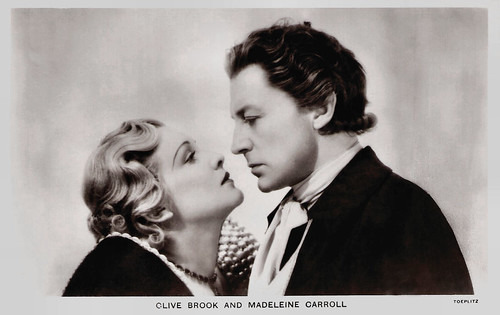
British postcard by Real Photograph, London in the Film Partners series, no. P 166. Photo: Toeplitz. Madeleine Carroll and Clive Brook in The Dictator (Victor Saville, 1935).
Crowning achievement
Clive Brook adapted the comedy 'On Approval' by Frederick Lonsdale and produced, directed and starred in the film version, On Approval (1945) with Beatrice Lillie, Googie Withers and Roland Culver. The costumes were designed by Cecil Beaton. It was Brooks' crowning achievement.
For the rest of his career, he concentrated on stage work. In 1951, Brook starred on Broadway as Josiah Bolton in the comedy 'Second Threshold'. In 1956 he appeared on stage in 'One Bright Day' at the Apollo Theatre in London.
He also made occasional appearances on British radio and television. In 1949 he presented the radio series 'The Secrets of Scotland Yard'. Brook appeared in a number of British television dramas, notably in the 'ITV Play of the Week' strand on the fledgling Independent Television commercial channel.
Brook made only one more film, the mystery The List of Adrian Messenger (John Huston, 1963) starring Kirk Douglas, George C. Scott and Dana Wynter.
Clive Brook died in London in 1974. Until his death, he was married to his former co-star, Charlotte Elisabeth Mildred Evelyn, whom he had wed in 1920. Their late daughter, Faith Brook (1922-2012) and son, Lyndon Brook (1926-2004) were also actors.
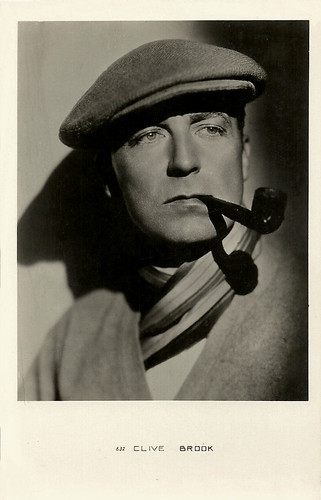
Dutch postcard, no. 632.
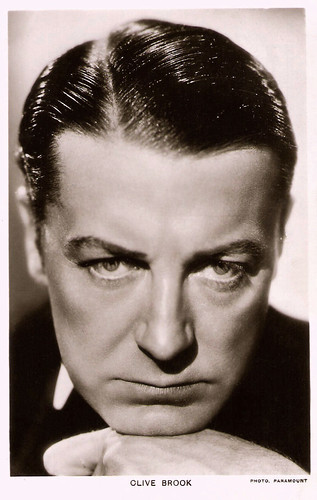
British postcard. Photo: Paramount.
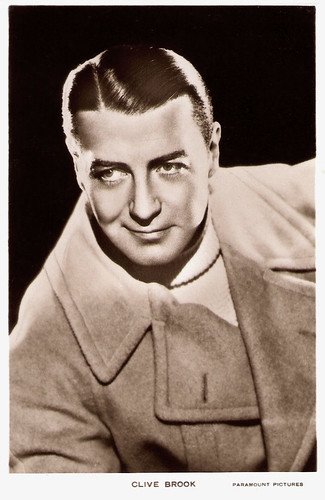
British postcard. Photo: Paramount.
Sources: Thomas Staedeli (Cyranos), Dave Curbow (IMDb), AllMovie, Wikipedia and IMDb
This post was last updated on 14 August 2023.
No comments:
Post a Comment